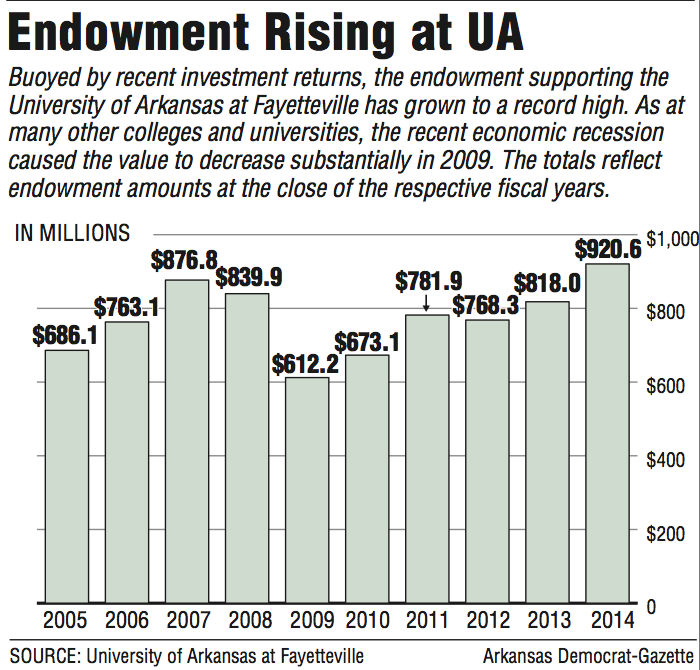The endowment supporting the University of Arkansas at Fayetteville has grown to $920.6 million, a record amount for the university and the first year it has surpassed its pre-recession total.
The estimated one-year investment return for the fiscal year ending June 30, 2014, was 16 percent and the annualized average return over the past five years was 13 percent, Clay Davis, executive director and treasurer for the University of Arkansas Foundation, said in a statement released by the university.
"That, of course, is the main driver of endowment growth for our campuses," he said.
The foundation manages the investment portfolio for the endowment, which supports the Fayetteville campus but not other UA System universities.
A key source of funding support, the endowment serves as the university's permanent savings fund. A percentage of investment earnings is spent in support of areas such as academic programs, endowed positions such as academic chairs, and fellowships and scholarships.
According to the Association of Public and Land-Grant Universities, an annual investment return of 9 percent to 10 percent is required to cover educational spending, inflation and management costs for a typical university endowment.
The endowment total released by UA includes totals from other foundations, such as an agriculture-related foundation supporting the UA Division of Agriculture and the Razorback Foundation, which supports the university's athletic teams.
The total represents the amount at the close of the most recent fiscal year -- and the end of a journey to recover after the hit from the financial crisis that began in 2007.
The endowment reached $876.8 million at the close of fiscal 2007, seemingly on its way to reaching $1 billion by 2010, a goal set in 2004 by then-Chancellor John White.
But a tumbling stock market led to the endowment value falling to $612.2 million at the end of fiscal 2009.
Since then, the endowment has risen every year except for fiscal 2012, when it dipped by less than 2 percent. The most recent total is an increase of 13 percent compared with a year earlier, when the endowment stood at $818 million.
Nationally, an endowment's steep fall and slow rise in value "is not atypical," said Ken Redd, director of research and policy analysis for the National Association of College and University Business Officers. Over the same two-year period that the UA endowment fell by about 30 percent, university endowments on average slipped by about 22 percent, according to the association.
"There are still endowments below what they were at in 2008," Redd said.
The organization publishes data ranking university endowments for private and public universities in the United States and Canada. The 2013 market value of UA's endowment -- a measure slightly different than released by the university -- put it at 98th place. But Redd said some of the ranked endowments support multiple campuses, making it difficult to make direct comparisons.
UA's endowment is larger than what typically supports one university, he said.
"The median endowment of the surveyed endowments is about $100 million. To be 98th puts you in the top quarter, just about, of our institutions, so it's a quite good and healthy balance," Redd said.
Financial resources per student can be a criteria in national rankings of colleges and universities, as it is with rankings compiled by U.S. News & World Report. UA leaders have set a goal of being one of the top 50 public universities, with the university listed No. 63 in the most recent rankings.
But "the reputation of faculty and students probably plays a bigger role" in any ranking of universities, Redd said.
For a public university, Redd noted that a larger endowment can mean a decreased reliance on taxpayer-supported funding.
"It's good for the university but also good for the state," Redd said.
In the late 1990s, UA's endowment totaled $119 million. The university in 1998 began its ambitious Campaign for the Twenty-First Century fundraising drive, which in 2005 eclipsed a goal to raise $1 billion in gifts and pledges.
Dramatic growth in the endowment came about quickly in part because of a $300 million gift received in 2003 from the Walton Family Charitable Support Foundation, the foundation set up by the family that founded Wal-Mart Stores Inc.
NW News on 08/24/2014
